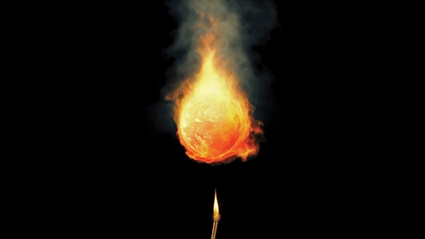Fiery Days for Georgia
Op-Ed
What’s amiss in Georgia? Who wants to set us alight? Are we being incinerated? And if so, who’s responsible: Man or nature? Or both in their own turn and way? Acres of wood gone, air polluted, businesses burned to the ground, damage calculated in millions, and all this in just six months.
Believers ascribe the “disaster” to God’s Will, nonbelievers nurse the desire to hang it on a mismanaged country, while conspiracy theory addicts will throw in sabotage for good measure. With our proclivity for investigating every little incident in our everyday lives and waiting for the results of that investigation to be able to make a conclusion, we might have to sit on it for a while until the presumed “sabotage” is exposed and given over to judgment. The role of mismanagement in things like fire outbreaks is very difficult to prove; so for the time being, God’s Will seems to be the easiest explanation for the continuing ubiquitous fires around the country and the most affordable way to write the consequences off.
I’ve been around for more than seventy-five years and I’ve never in my lifetime seen anything like this in Georgia. We have gone through many scorching droughts and red-hot days, but never so many consequential fires. Yet, based on the presumption of the divine disposal of our lives, anything can happen to us if nature wants it to happen. On the other hand, fires occur everywhere around the globe in summer; annually consuming thousands of acres of California’s wonderful forests; claiming human lives and property in abundance in every corner of the planet except the icy North, though even that part of the world is not safe from the wrath of the fulminating creator of the universe.
I certainly hate to sound overly mystical at this realistic moment of national hardship, especially being well-aware that damage is damage whether thrown down on us by Mother Nature or just a regular mortal. The most to-the-point question now is whether the fires could have been prevented and the damage minimized if we had taken the relevant measures in expectation of one of the hottest summers Georgia has ever seen. Specialists have counted hundreds of fire hotbeds in the last fortnight and tens of fires in the latest half a year. This is a very strange summer, but it cannot be helped except in the way it is handled using available local and foreign capacities.
I’m talking about future over-heated summers in our forests and possible fires in urban residential and industrial areas. We will probably have to coach more people in the manner of firefighting and have in reserve squads of qualified volunteers who will have gone through such training courses; our soldiers will have to add to their programs a course on fire-fighting; ample paths and roads will have to be cut through our woods and forests in advance; money will have to be spent on the purchase of more and better equipment and transportation; more water reservoirs will have to be built in the most fire-vulnerable spots; the areas of interest will have to be manned in relevant numbers; not even a single fire breeding ground should escape our attention or ability to quench it on the spot as soon as the flames begin to lick. This is by no means a complete list of fire do’s and don’ts. Investigation of the entire fire saga is, of course, an animal of a totally different color. This is a field of a very special consideration, although the strange behavior of nature is still on our minds as the central point of our focus. No matter how powerful and insistent the suspicions of subterfuge ploys and tricks are, no solid deductions can be made at this point in time. And so we wait again for the outcomes of the investigations…
Nugzar B. Ruhadze












